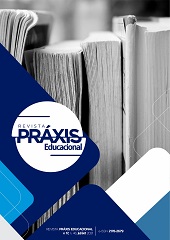Seed pedagogics of the zapatista movement: emergence of a political collective subject
DOI:
https://doi.org/10.22481/praxisedu.v17i46.8492Keywords:
Indigenous epistemologies and philosophies, Liberation pedagogics, ZapatismoAbstract
This article theorizes the political-educational-ethical process that emerges from Zapatismo and that is implemented outside its autonomous territories. We propose naming it a “pedagogics” in the multifaceted sense given the word by philosopher Enrique Dussel, and “of seed” as it is a political-ethical education that is sown and develops through the cross-fertilization of intercultural encounter and exchange. This “pedagogics of seed” is weaving a collective political subjectivity with revolutionary potential that struggles for a dignified life in common. It is part of an ongoing socio-historical resistance in the face of systems and practices of human domination; a movement of movements that both includes and transcends singular struggles. The seed pedagogics we theorize here are based on the Zapatista Movement’s praxis since 1994 and their interlocution with the world outside their autonomous communities. This pedagogics seeks to integrate what Cartesian modernity and colonial imposition have separated: knowledge and relationship between human communities and the nature of which they are an integral part. This article theorizes ways in which this Zapatista seed pedagogics proposes, practices, and advances political and socio-ecological relations and ethics.
Downloads
Metrics
References
Barbosa, Lia Pinheiro. “Paradigma Epistêmico do Campo e a construção do conhecimento na perspectiva dos movimentos indígenas e camponeses da América Latina”. In: Santos, Arlete Ramos dos; Coelho, Lívia Andrade; Oliveira, Júlia Maria da Silva (Orgs.) Educação e movimentos sociais. Análises e desafios. Volume 4. Jundiaí: Paco Editorial, 2019a, p. 279-300.
_________________. Estética da resistência: arte sentipensante e educação na práxis política indígena e camponesa latino-americana. Conhecer: debate entre o público e o privado, Vol. 09, nº 23, 2019b, p. 29-62.
__________________. O Popol Wuj na contemporânea luta indígena mesoamericana. Tensões Mundiais, Vol. 15, n. 28, 2019c, p. 75-102.
__________________. “Educação rebelde e autónoma na práxis revolucionária Zapatista”. In: Rebuá, Eduardo; Silva, Pedro (Orgs.). Educação e filosofia da práxis: reflexões de início de século. Rio de Janeiro: Letra Capital, 2016, p. 48-79.
_________________. Educación, Resistencia y Movimientos Sociales: la praxis educativo-política de los Sin Tierra y de los Zapatistas, UNAM, México, 2015.
_________________. Educación y lucha autonómica en la Voz Zapatista: aportes de la Pedagogía del Sentir-Ser, Sentir-Pensar, Sentir-Saber. Revista Educación y Cultura, 105, 2014, p. 21-27.
Barkin, David y Sánchez, Alejandra. (2019) The communitarian revolutionary subject: new forms of social transformation. In Third World Quarterly. DOI: 10.1080/01436597.2019.1636370
Baronnet, Bruno. (2012) Autonomía y Educación Indígena: las escuelas Zapatistas de la Selva Lacandona de Chiapas, México. Ediciones Abya-Yala. Quito, Ecuador.
Dussel, Enrique, David I. Backer, and Cecilia Diego (2019) PEDAGOGICS OF LIBERATION: a latin american philosophy of education. punctum books, Earth, Milky Way.
Estermann, Josef. (2014). Colonialidad, descolonización e interculturalidad: Apuntes desde la Filosofía Intercultural. Polis: Pueblos Indígenas y Descolonización, 38.
Escobar, Arturo. (2015) “Territorios de diferencia: la ontología política de los “derechos al territorio.” Cuadernos de Antropología Social.
______________. (2012) “Cultura y diferencia: la ontología política del campo de Cultura y Desarrollo.” Wale’keru Revista de Investigación en Cultural y Desarrollo, No.2.
EZLN, Ejercito Zapatista de Liberación Nacional, diversos comunicados 1994-2021, archivados vía Enlace Zapatista, http://enlaceZapatista.ezln.org.mx/
Foucault, Michel. (1992). El orden del discurso. Lección inaugural. In El Orden Del Discurso. Buenos Aires, Argentina: Tusquets Editores. https://doi.org/10.2307/3466552
Freire, Paulo. (1970) Pedagogía del Oprimido. Montevideo: Tierra Nueva.
Gunderson, Christopher (2013) “The provocative cocktail: Intellectual origins of the Zapatista uprising, 1960-1994.” Doctoral thesis, City University of New York. 605;358972n
Leff, Enrique. (2014) La apuesta por la vida: imaginación sociológica e imaginarios sociales en los territorios ambientales del sur. México: siglo XXI editores.
___________. (2006) Aventuras de la epistemología ambiental: de la articulación de ciencias al diálogo de saberes. México: siglo XXI editores.
Lenkersdorf, Carlos. (2006) “The Tojolabal Language and Their Social Sciences” Journal of Multicultural Discourses, 1:2, 97-114, DOI: 10.2167/md015.0
_________________. (2008) Aprender a escuchar: enseñanzas maya-tojolabales.
México: Plaza y Valdés editores.
López Inztín, Juan. (2015) Ich’el-ta-muk’: La trama en la construcción del Lekil-kuxlejal. Practicas Otras de Conocimiento(s): entre crisis, entre guerras. Leyva et al. Eds. SCLC, Chiapas. Editorial Retos.
_________________. (2013) Ich’el-ta-muk’: la trama en la construcción del Lekil-kuxlejal (vida plena-digna-justa) en Senti-pensar el género: perspectivas desde los pueblos originarios. Coords. Georgina Méndez Torres et al. Guadalajara, Editorial La Casa del Mago.
Maldonado, Benjamín. (2015) La Comunalidad Como Una Perspectiva Antropológica India. Tlatelolco, México: Ediciones La Social.
Mendoza Sánchez, Citlali & Raúl Ernesto García Rodríguez. (2015) Discursos ético-políticos y prácticas sociales cotidianas en las comunidades Zapatistas. Psicologia & Sociedade, 27(3), 650-659.
Mora, Mariana. (2017) Kuxlejal Politics: Indigenous Autonomies, Race, and Decolonizing Research in Zapatista Communities, University of Texas Press.
Nietschmann, Bernard (1994) The Fourth World: Nations vs. States. The Reordering of the World: Geopolitical Perspectives on the Twenty-first Century. Demko, G. and Wood, W. Eds. Westview Press.
Pérez Moreno, María Patricia. (2021) “El bats’il K’op tseltal frente al proceso colonial” Descolonización. Revista de la Universidad de México. No. 871, Cultura UNAM, Ciudad de México.
Downloads
Published
How to Cite
Issue
Section
License
Copyright (c) 2021 Práxis Educacional

This work is licensed under a Creative Commons Attribution-ShareAlike 4.0 International License.
You are free to:
Share - copy and redistribute the material in any medium or format; Adapt - remix, transform, and build from the material for any purpose, even commercially. This license is acceptable for Free Cultural Works. The licensor cannot revoke these freedoms as long as you follow the terms of the license.
Under the following terms:
Attribution - You must appropriately give credit, provide a link to the license, and indicate if any changes have been made. You may do so in any reasonable way, but not in a way that suggests that you or your use is endorsed by the licensor.
There are no additional restrictions - You cannot apply legal terms or technological measures that legally restrict others to make any use permitted by the license.










